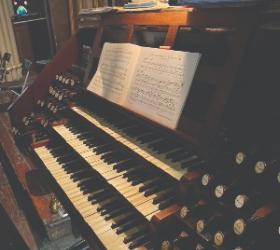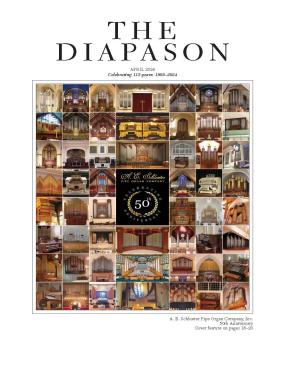
Abundant citings of musical instruments in tales of murder
It has been nearly ten years since I updated my listings of harpsichords in murder mysteries; here are some additional citings.
Popular writer Lawrence Sanders delights his readers with a series of books featuring the urbane, witty, and somewhat-musically-savvy sleuth Archie McNally, Private Investigator of Palm Beach, Florida. In McNally’s Luck (New York: Berkley Books, 1993) the plot introduces us to a kidnapped cat, an esoteric poet turned sensualist, and an amorous psychic. These disparate characters involve the sartorially-elegant investigator in his merry and witty adventure. Imagine the sheer delight of coming upon this sentence in the midst of a scene in which our hero is being pistol-whipped by a killer: “. . . I remained silent and tried to calculate the odds against my ever playing the harpsichord again.” [page 288]
In McNally’s Caper (Berkley Books, 1995) Archie investigates the low-down scandals of Palm Beach high society, particularly the disappearance of a rare Edgar Allen Poe first edition from the library of the wealthy Forsythe family. The book provides an absolute happiness of harpsichord citations! Obviously of superior taste, Mrs. Sylvia, the wife of the young Forsythe heir, is overheard playing the harpsichord, in a “. . . mid-sized chamber completely naked of any furnishings except for the bleached pine harpsichord and the bench before it.” [pages 23–24] She had been practicing something by Vivaldi (undoubtedly in one of the Bach transcriptions). Mrs. Sylvia also explains to Archie that she constructed her instrument from a kit.
Other mentions of our favorite instrument appear on pages 69, 86, 111–112, 224, and 265 (where Archie wonders if Mrs. Sylvia is trying to play him “like a human harpsichord?”). On page 187 he corrects a maid’s mispronunciation (the ubiquitous “harpISchord”), and, in a final (and less classy) musical allusion [page 324] he hopes to “live to play the kazoo again.”
Continuing this descent from harpsichord-Olympus, in McNally’s Puzzle (1996), the title character reflects “. . .[ a] slow swim had the desired effect: it calmed me, soothed me, and convinced me that one day I might learn to write haiku or play the bagpipes.” [page 84] At least he remains ever musical, our Archie.
Death in Holy Orders (London: Faber & Faber, 2001) by Baroness P. D. James is a thriller that is truly a “cliff-hanger” (the setting is sea-side, in England’s barren East Anglia near Lowestoft—Benjamin Britten country!). Detective Adam Dalgliesh returns to his adolescent haunts, the Victorian Gothic St. Anselm Theological College, where a murderer seems to be picking off the residents at a rather alarming rate. At least two of the four deaths appear to be from natural causes, but Dalgliesh has an intuitive feeling that all of them must be related in some manner.
Although there is no harpsichord cited in this one, but we do get specific reference to countertenor James Bowman’s recording of Handel’s Ombra mai fu; surely there must be a keyboard instrument lurking somewhere in the continuo [page 251]. In another musical mention we are told of well-sung plainsong.
Jane Haddam’s series of holiday mysteries featuring former FBI agent Gregor Demarkian are briskly plotted and well written. Not A Creature Was Stirring (New York: Bantam Books, 1990) takes place from December 1 until Epiphany (January 6), and, as might be expected, there is Christmas music to be heard.
“Music was so much a part of Christmas at Engine House, Bennis hadn’t noticed it before. Ten years ago, Mother had made a single concession to modernity. She’d had all the common rooms in the house wired into a stereo system. At the moment, that system was pumping out an organ rendition of ‘Silent Night.’ . . . ‘Silent Night’ had become ‘Noel,’ played on a harpsichord. The instrument sounded tinny, as if it had been discovered after being long abandoned, and played without being retuned. Mother used to play the harpsichord.”
“. . .Overhead, ‘Silent Night’ became ‘The Holly and the Ivy’—played on a virginal. Mother used to play the virginal, too. For all Bennis knew, Mother had played the music she was hearing now, and recorded it, against the time she would no longer be able to make the carols herself.” [pages 128–129]
One last swipe at plucked stringed keyboard instruments is found on page 217: “ ‘I see you got the music off,’ Myra said. ‘God, it was driving me nuts. All that tinny harpsichord music. . . . Just because Mother loves harpsichord music doesn’t mean I have to. And it was eerie, all those Christmas carols and everybody in mourning.’ “
In Body Blows, by Steven Simmons, (New York: Pocket Books, 1987), ex-Yale hustler Cal Lynch is plying his trade in California. His friend Lena is an organist. Staying alone in her apartment he hears “. . . the sound of music, slightly menacing, pseudo-oriental music, the kind you hear in forties movies when the main character enters an opium den. . . . I get out of bed and make my way slowly down the carpeted hall, following the strange music . . . ‘Lena?’ The music suddenly stops. . . . No answer. Cautiously I step into the room, and just then the piano notes ring out again, and I find Alexander, the fat Siamese, walking back and forth across the keyboard of the antique clavichord in the far corner . . .” [page 221]
Shades of Kirkpatrick number 30 (the Cat’s Fugue), and apologies to Domenico Scarlatti!
How about a story with plot based on quotations from Handel’s Messiah? Such is the case in multi-talented Jane Langton’s The Memorial Hall Murder (New York: Penguin Books, 1981). Harvard professor and amateur sleuth Homer Kelly is featured in this tale of bombing and a headless corpse in the Cambridge school’s Memorial Hall. Well-liked chorus conductor Hamilton Dow is missing and it takes Kelly, his wife and friends, and Messiah itself to arrive at a satisfactory conclusion. The frontispiece shows the text and music of “Behold, I tell you a mystery,” with the author’s drawing of cello and toppled music stand. Each of the ensuing fifty chapters is prefaced with a bit of musical score, as well, most with an equally-appropriate text. The volume is replete with further drawings by the author. Harpsichord, as part of the Messiah orchestra, is mentioned on pages 30, 32, 11, and 126; as an artifact in Dow’s overstuffed living room, on page 135.
In one of her later Homer Kelly mysteries, Divine Inspiration (1993), Langton writes and draws another musically-inspired tale, this one dealing with the installation of a new organ in the mythical First Church of the Commonwealth in Boston. Lots of Luther quotations and Bach chorales in this one, and the organ builders seem remarkably similar to a well-known firm in nearby Gloucester, Massachusetts. As a bonus, if you store this book in your organ bench, you’ll have In dir ist Freude from JSB’s Orgelbüchlein right at hand: the whole piece is printed following the Afterword, on page 407.
Send literary references to early keyboard instruments or other items of interest for Harpsichord News to Dr. Larry Palmer, Division of Music, Meadows School of the Arts, Southern Methodist University, Dallas, TX 75275. Email <[email protected]>




